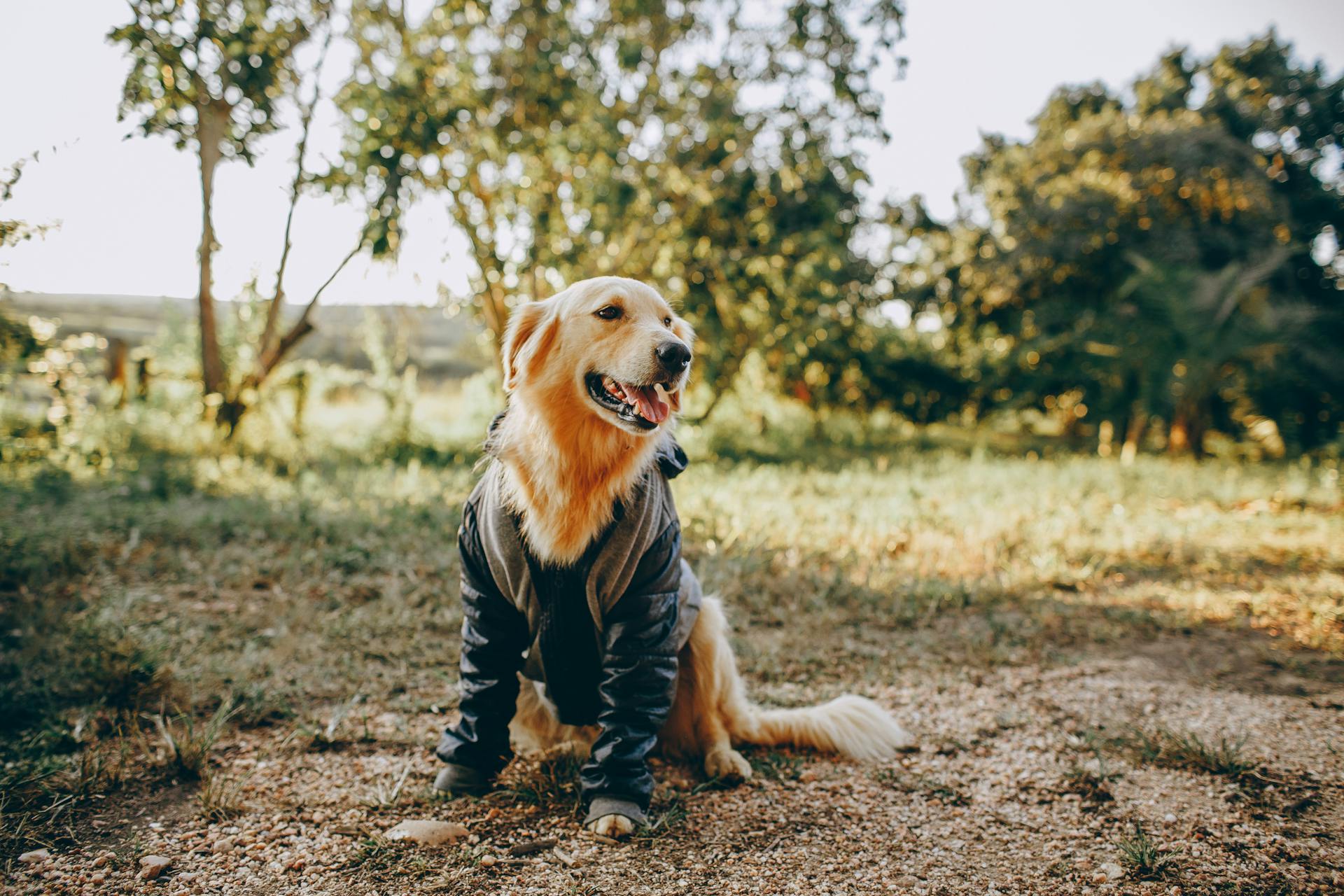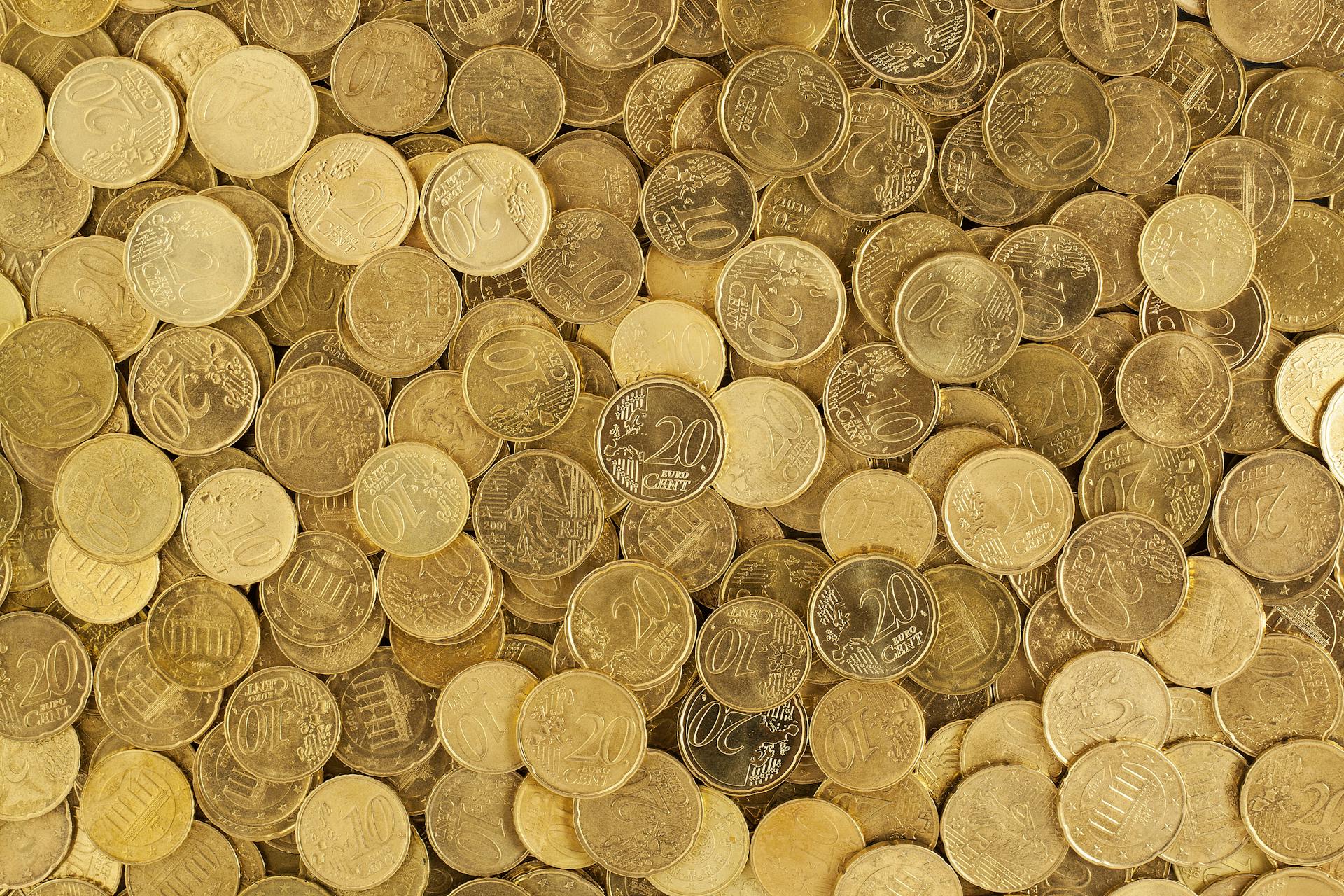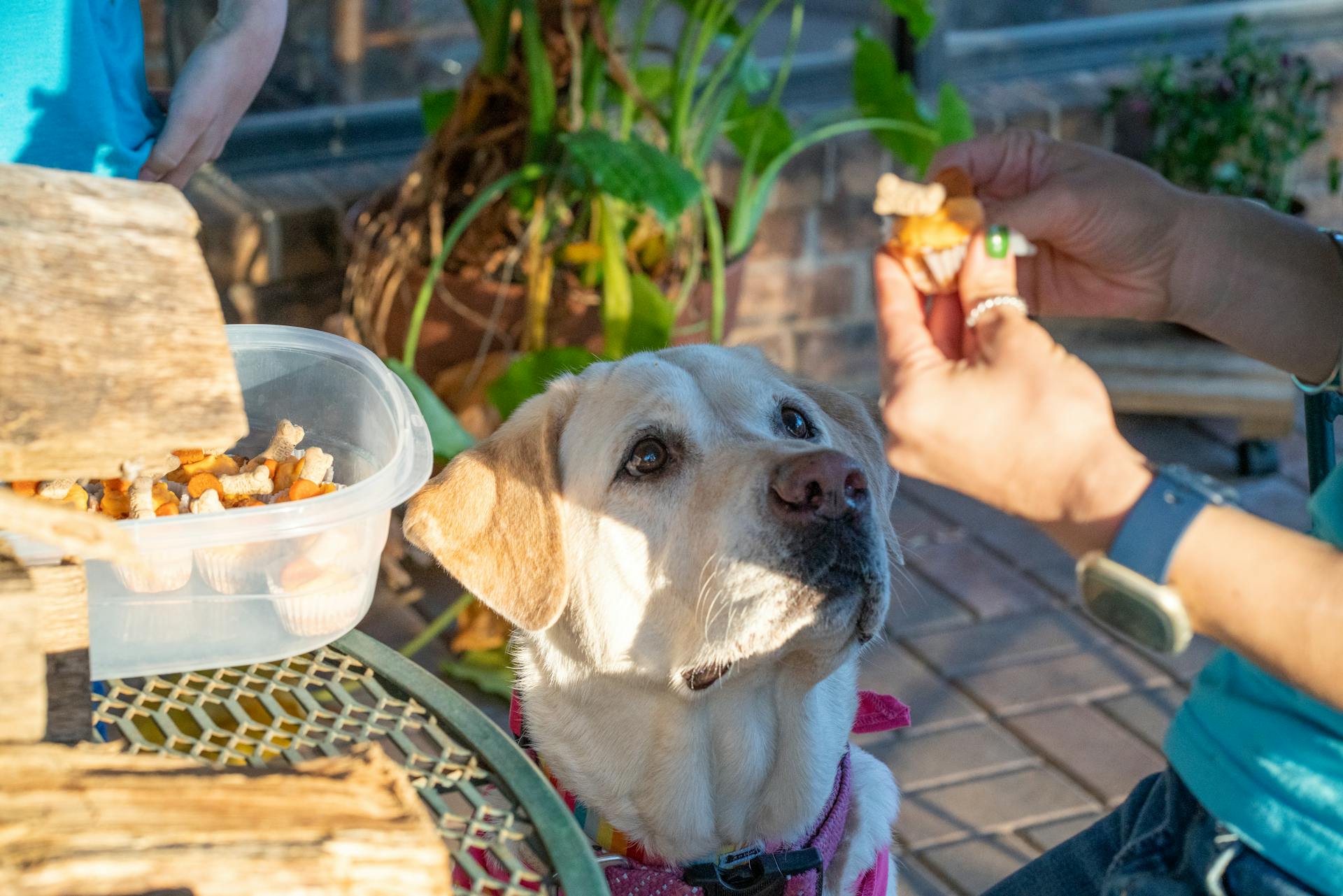
Golden Labs are a cross between a Golden Retriever and a Labrador Retriever, resulting in a friendly, loyal, and energetic breed.
They typically weigh between 65-80 pounds and stand between 21.5-24.5 inches tall at the shoulder.
Their short, dense coat requires regular grooming to prevent matting and tangling.
Their friendly nature makes them a great breed for families with children, but they do require regular exercise to stay happy and healthy.
Physical Characteristics
Golden Labs have a sturdy build and a friendly expression, making them a joy to be around.
Their coat is a dense double coat that's water-resistant, perfect for withstanding various weather conditions.
Golden Labs come in a range of colors, including shades of gold, cream, and yellow.
Their floppy ears and expressive eyes add to their adorable appearance.
One of the most striking features of Golden Labs is their intelligent and kind eyes, which seem to radiate warmth and affection.
Their athletic build and wagging tail give them a playful and energetic appearance, reflecting their lively and outgoing personality.
Golden Labs typically stand between 21 to 24 inches tall at the shoulder.
Males are slightly larger than females, weighing between 55 to 80 pounds.
Their well-proportioned bodies and balanced gait make them agile and versatile.
Their tail, resembling that of an otter, is thick at the base and tapers to a point, adding to their unique appearance.
History and Origins
The Golden Lab is a relatively new hybrid breed created by crossing a Golden Retriever with a Labrador Retriever. Both parent breeds have a long history of being bred as hunting companions.
The Golden Retriever originated in Scotland in the mid-19th century, while the Labrador Retriever hails from Newfoundland in the early 19th century. The Labrador Retriever was originally bred from St. John's water dogs, which were introduced to Britain from ships trading between Canada and Poole in Dorset.
You might enjoy: Golden Brown Labrador
The Labrador Retriever was recognized by the Kennel Club in 1903 and by the American Kennel Club in 1917. The Golden Lab combines the traits of these two beloved breeds to create a versatile and affectionate family pet.
The Golden Lab is not recognized as a distinct breed by major kennel clubs, but their popularity has soared in recent years due to their winning combination of intelligence, trainability, and sociability.
Temperament and Personality
Golden Labs are known for their friendly and outgoing nature, making them excellent family pets and companions. They are sociable and affectionate dogs that thrive on human companionship and attention.
Their intelligence and eagerness to please make them highly trainable and responsive to positive reinforcement. They excel in obedience training, agility, and various canine sports.
Golden Labs are great with children, other pets, and strangers, making them ideal for households with multiple animals or frequent visitors. They are also known for their gentle and patient demeanor, making them well-suited for therapy work and service dog roles.
For more insights, see: Black Labs Mixed with German Shepherds
Despite their friendly nature, Golden Labs have a playful and energetic side that requires regular exercise and mental stimulation. They enjoy activities like fetching, swimming, and hiking, which help them burn off excess energy and keep them mentally engaged.
Here are some key temperament and personality traits of Golden Labs:
- Friendliness: Golden Labs are famously friendly and outgoing.
- Trainability: They are highly trainable and have a strong desire to please.
- Loyalty: They are devoted and protective, making them exceptional companions.
- Gentleness: They have a patient and gentle demeanor.
- Playfulness: They thoroughly enjoy activities like fetch and swimming.
As individuals, Golden Labs can vary in personality, with some being more mellow and others higher energy. Some may be more anxious, while others are naturally more confident and joyful.
Health and Wellbeing
Golden Labs are prone to certain health issues that owners should be aware of to ensure their pet's well-being.
Regular veterinary check-ups, a balanced diet, and plenty of exercise can help mitigate common health concerns such as hip dysplasia, elbow dysplasia, eye problems, and obesity.
Obesity can lead to a host of health problems, including joint issues, heart disease, and diabetes, so it's essential to monitor your dog's weight and adjust their food intake and activity level accordingly.
A high-quality diet tailored to your Golden Lab's age, size, and activity level is crucial for their overall health and longevity.
Both Golden Retrievers and Labradors are agile, high-spirited dogs with great energy and a similar lifespan of 10-12 years.
In some instances, your Lab or Golden may live as long as 14-15 years, but regular veterinary check-ups can improve the prognosis and treatment options for any potential medical concerns.
Both breeds are predisposed to several health concerns, including hip dysplasia, elbow dysplasia, bloat, laryngeal paralysis, ear infections, retinal atrophy, and certain heart disorders.
Labradors have a higher predisposition to exercise-induced collapse due to their slightly higher energy levels, while Golden Retrievers are slightly more prone to certain cancers, including hemangiosarcomas.
Regular exercise and a balanced diet can greatly contribute to managing health concerns and improving their lifespan, and providing proper care and attention can greatly enhance their overall health and longevity.
Expand your knowledge: Black Lab Dog Years
Exercise and Training
Exercise and training are essential for Golden Labs to stay happy and healthy. Engaging in regular physical activity helps burn off excess energy, prevent boredom, and strengthen the bond between you and your furry companion.
Golden Labs thrive on staying active and engaged, so mixing up their exercise routine can keep them mentally stimulated and physically fit. Consistency is key for Golden Labs, so establishing a regular schedule for walks, playtime, and training sessions can help them feel secure and balanced.
Golden Labs are quick learners that respond well to consistent and patient training techniques, and building a strong bond with your Golden Lab through training can enhance communication, trust, and mutual respect between you and your furry companion.
Exercise
Exercise is essential for happy and healthy dogs, and Golden Labs are no exception. They require daily exercise to burn off excess energy and prevent boredom.
Golden Labs thrive on physical activity, whether it's a brisk walk, a game of fetch, or a swim in a nearby lake. Consistency is key, so establish a regular schedule for walks, playtime, and training sessions.
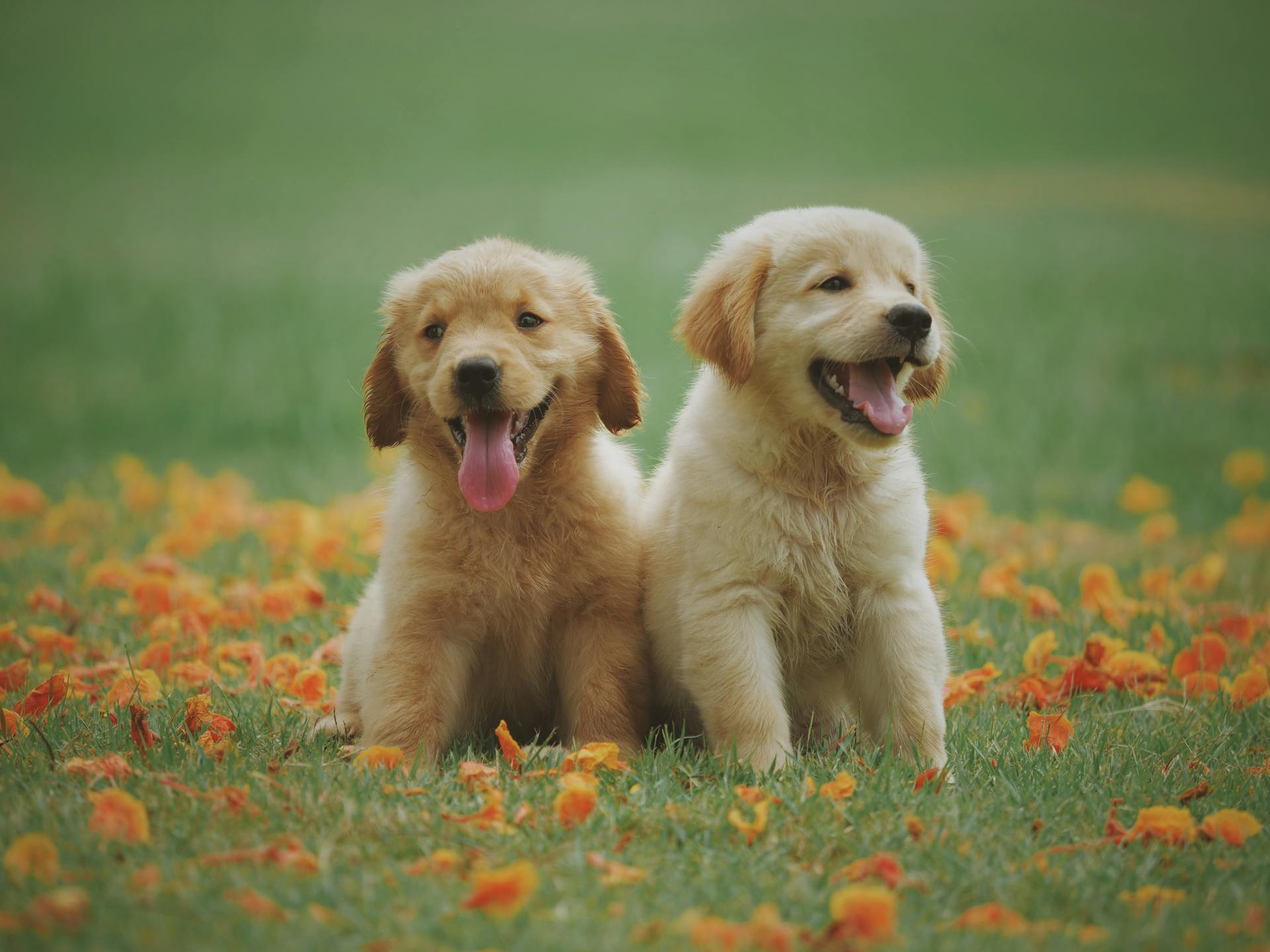
A mix of activities is best, including walks, runs, hikes, agility training, and interactive play sessions. This keeps them mentally stimulated and physically fit.
Labrador Retrievers, like Max, my energetic friend, require at least an hour of exercise every day. Golden Retrievers, on the other hand, have a slightly lower energy level and may be satisfied with slightly less intense activities.
Here's a comparison of the exercise needs of Labrador and Golden Retrievers:
Golden Labs love to explore new environments and experience new sights and smells, so mixing up their exercise routine can keep them mentally stimulated and physically fit.
Training
Training is an essential aspect of owning a Golden Lab, as these intelligent and eager-to-please dogs thrive on mental stimulation and positive reinforcement.
Building a strong bond with your Golden Lab through training can enhance communication, trust, and mutual respect between you and your furry companion. Consistency, patience, and clear communication are essential for effective training, as Golden Labs can pick up on subtle cues and body language from their owners.

Golden Labs are quick learners that respond well to consistent and patient training techniques. They love to learn and please their owners, making them a joy to train.
Using positive reinforcement techniques such as treats, praise, and playtime to reward good behavior is key to successful training with Golden Labs. This encourages your dog to repeat desired actions and behaviors while reinforcing the bond between you.
Focusing on building a strong foundation of basic commands like sit, stay, come, and heel before moving on to more advanced skills is crucial for effective training. Using short training sessions that are fun and engaging can keep your dog motivated and interested in learning new behaviors.
Golden Labs respond best to praise and encouragement rather than harsh corrections or punishment, so keep training sessions positive and upbeat.
Grooming and Nutrition
Golden Labs require regular grooming to keep their coat healthy and free of mats and tangles. Brushing their coat at least once a week can help remove loose fur, dirt, and debris.
On a similar theme: Golden Retriever Red Coat
Bathing your Golden Lab every 6 to 8 weeks with a gentle dog shampoo can help keep their coat clean and free of odors. Thoroughly rinse out all shampoo residue to prevent skin irritation and dryness.
In addition to grooming, dental care is crucial for your Golden Lab's overall health. Brushing their teeth daily with a dog-specific toothpaste can help prevent tartar buildup and gum disease.
A balanced and nutritious diet is essential for your Golden Lab's overall health and well-being. Providing them with a high-quality commercial dog food that lists a high-quality protein source as the first ingredient can help ensure they receive the essential nutrients they need.
Grooming and Maintenance
Grooming and Maintenance is a crucial aspect of owning a Golden Retriever or Labrador. Regular grooming can help prevent matting and remove loose hair, keeping your dog's coat healthy and looking its best.
Brush your dog's coat at least once a week to remove loose fur, dirt, and debris, and distribute natural oils for healthy skin and coat. Brushing behind the ears, under the legs, and around the tail requires extra attention to prevent matting.
Bathing your dog every 6 to 8 weeks with a gentle dog shampoo can keep their coat clean and free of odors. Be sure to thoroughly rinse out all shampoo residue to prevent skin irritation and dryness.
Trim your dog's nails regularly to prevent overgrowth and discomfort, and clean their ears with a vet-approved ear cleaner to prevent infections and wax buildup. This will help keep your dog's ears healthy and prevent infections.
Dental care is also an important aspect of your dog's overall health. Brushing your dog's teeth daily with a dog-specific toothpaste can help prevent tartar buildup, gum disease, and bad breath.
To keep your dog's oral hygiene in check, consider the following:
- Brush their teeth daily with a dog-specific toothpaste.
- Provide chew toys and dental treats to help maintain their oral health.
- Visit a veterinarian for regular dental check-ups.
Remember, both breeds have a tendency to shed, so be prepared for regular vacuuming and grooming sessions. Visiting a professional groomer for more intricate grooming needs is also recommended.
Nutrition
Providing your Golden Lab with a high-quality commercial dog food that's formulated for their age, size, and activity level is crucial for their overall health and well-being.
A balanced diet that lists a high-quality protein source, such as chicken, beef, or fish, as the first ingredient is essential for your dog's nutritional needs.
Feeding your Golden Lab the right amount of food based on their weight, age, and activity level is vital for maintaining a healthy weight and preventing obesity.
Overfeeding or free-feeding can lead to weight gain and related health issues, so it's essential to monitor your dog's body condition and adjust their food intake as needed.
Providing your Golden Lab with fresh water at all times is crucial for proper hydration and overall health.
Treats should be given in moderation as rewards during training sessions or as occasional snacks, but be mindful of the calorie content and nutritional value to avoid overfeeding.
For more insights, see: Average Chocolate Lab Weight
Living Needs and Care
Labs adore their owners and will want to live indoors, sleeping as close as possible to you or even on you. They need plenty of sturdy chew toys to keep them entertained, as they have a naughty side and may dig and chew.
A daily 30-minute walk or a lively game of fetch will help your pup burn off some of his energy. Lack of activity could lead to undesirable behavior, but don't overdo it - this "workaholic" breed is apt to exhaust itself.
They are happy to bounce around the yard with children, and if properly introduced and trained, Labs can also get along well with other pets in the home, including cats, other dogs, and small animals.
Living Needs
Labs adore their owners and will want to live indoors, sleeping as close as possible to you, or even on you.
They require regular exercise, but be cautious not to leave them unattended for too long, as they may prove to be naughty and dig or chew.
A large fenced backyard is ideal for these active breeds, but they can thrive in smaller spaces with regular physical activities and mental stimulation.
Daily brushing will help reduce the shedding of their thick double coat, which can lead to tumbleweeds of fur scattered about your house.

A daily 30-minute walk or a lively game of fetch will help your pup burn off some energy, but be careful not to overdo it, as Labs are prone to exhaustion.
Labs are happy to bounce around the yard with children and can get along well with other pets, including cats, other dogs, and small animals, if properly introduced and trained.
Their reputation for good behavior precedes them, but they still require training to prevent rowdy behavior and ensure they grow into the friendly Lab many know and love.
They need a job and plenty of training, but they are almost always very biddable and like to please, making them a joy to train.
Labs enjoy training and do well in obedience competitions, so be sure to introduce them to training early and provide positive reinforcement.
Don't let Lab puppies run and play on hard surfaces for their first two years, as they may damage their joints.
Remove
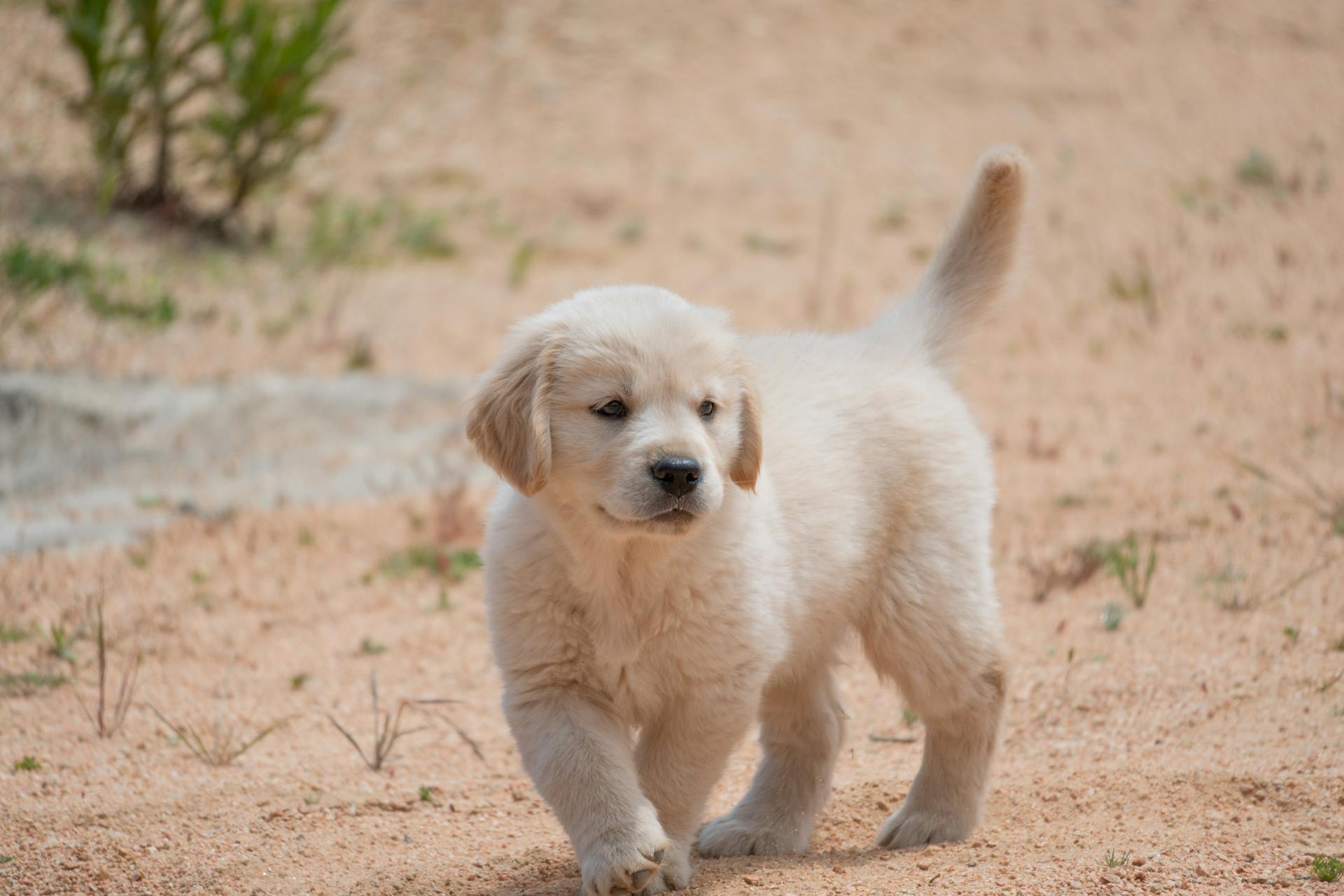
Labrador Retrievers require regular exercise to stay mentally and physically stimulated.
Labradors need at least 30 minutes of exercise per day, which can include walks, runs, and playtime.
Their high energy levels make them unsuitable for apartment living without regular outdoor time.
Labradors thrive on physical activity that challenges them, such as agility training or fetch games.
Their broad head and expressive eyes make them a joy to watch, but also require regular grooming to prevent matting.
Labradors are highly trainable and excel in obedience and agility training with positive reinforcement.
Their friendly and outgoing personality makes them excellent family pets, but also requires early socialization to prevent anxiety.
Similarities and Differences
Golden Retrievers and Labradors may seem like identical twins, but they have some key differences that set them apart. Both breeds are popular family pets, but their unique characteristics make them suited for different lifestyles.
Their coats are one of the most noticeable differences. Golden Retrievers have longer, thicker coats than Labradors, requiring more extensive grooming.
Both breeds are double-coated, but their coats are not the same. Labradors have a shorter, denser coat that's water-repellent, while Golden Retrievers have a longer, more flowing coat.
Despite their differences, both breeds are known for their friendly and sociable temperament. They're both great with families and make excellent companions.
Labradors are more energetic and may require more exercise and mental stimulation, while Golden Retrievers are more laid back and content with anything.
Are Good Pets for Families?
Golden Retrievers and Labrador Retrievers are great pets for families. They're known for their trainability, sociable nature, and loving attitudes towards humans and other dogs.
Both breeds are generally well-suited for living with children. However, it's essential to consider the specific needs and energy levels of each breed when choosing the perfect pooch pal for your family.
They provide lots of love, fun, and years of loyalty. Both Golden Retrievers and Labrador Retrievers can make a great family pet.
Recommended read: Lab Great Dane Mix Life Expectancy
Despite their size and physical differences, both breeds have an amicable and sociable temperament, which contributes to their popularity as family pets. This temperament is renowned in both breeds.
It's essential to consider the specific needs and energy levels of each breed when choosing the perfect pooch pal for your family. You can always consult with your veterinarian and local, reputable breeders to help determine which type of dog will best suit your family and lifestyle.
Expand your knowledge: Chocolate Lab Temperament
Shedding and Maintenance
Golden Retrievers and Labradors are both known to shed, so be prepared for regular vacuuming and grooming sessions. Their coats require regular grooming and maintenance to prevent matting and remove loose hair.
Golden Retrievers have a longer coat that requires more grooming, while Labradors have a shorter coat that is less maintenance but still sheds. This means that Golden Retrievers need more frequent brushing and grooming sessions.
To keep your Golden Lab looking their best, make sure to regularly groom and maintain their coat. This includes keeping their nails at a comfortable length by trimming them regularly, and preventing infections by regularly cleaning their ears.
Here are some essential grooming tasks to keep your Golden Lab in top shape:
- Regularly groom and maintain their coat to prevent matting and remove loose hair.
- Keep their nails at a comfortable length by trimming them regularly.
- Prevent infections by regularly cleaning their ears.
- Maintain their oral hygiene by brushing their teeth.
- Keep their coat clean and smelling fresh by bathing them as needed.
It's also recommended to visit a professional groomer for more intricate grooming needs, such as trimming their coat or cleaning their teeth.
Frequently Asked Questions
What is a lab golden mix called?
A Lab Golden mix is commonly known as a Goldador. This crossbreed combines the best traits of Labradors and Golden Retrievers to create a versatile and intelligent working dog.
What is a gold lab?
A Goldador is a cross between a Golden Retriever and a Labrador, known for its intelligence, loyalty, and affectionate nature. This medium-sized breed makes a great family dog, suitable for families with children and other pets.
Featured Images: pexels.com
